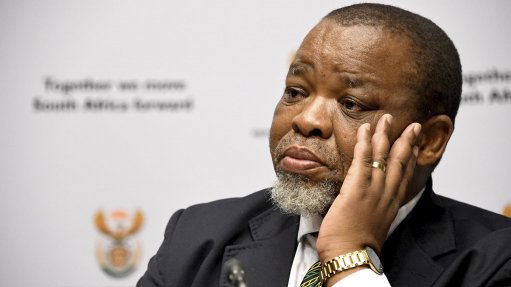
Mineral Resources and Energy Minister Gwede Mantashe
Deputy Director General of the Department of Mineral Resources Ntokozo Ngcwabe has slammed what she called "financial bullying" by funders who refuse to finance coal projects, saying that South Africa needs to pace itself in its move away from the polluting resource.
"We need to pace ourselves [in scaling down coal use] ... and not be pressured to meet certain deadlines by a certain time if we are not at the same level of development [as richer countries]," Ngcwabe said in a media interview on Wednesday.
The interview followed Mineral Resources and Energy Minister Gwede Mantashe's controversial comments on Tuesday, when he called on African nations to urgently form a united front to resist global pressure to abandon fossil fuels rapidly.
"Our continent collectively, and her individual countries, [are] made to bear the brunt for heavy polluters. We are being pressured, even compelled, to move away from all forms of fossil fuels, including resources such as gas, which have been regarded as key resource for industrialisation," Mantashe said.
He added that there had been a preoccupation with Africa to move away from its rich oil and gas resources, yet the continent is one of the least polluting.
"We've noticed with interest that when Britain, when China, when India, when Australia ran into [an] energy crisis, they all appealed to coal generation to give them more energy. You will notice that, but when they talk to us they say stop using coal immediately."
On Wednesday, Ngcwabe also referred to countries that upped their coal use amid electricity crises in the northern hemisphere.
"Look at Germany backtracking, coming back to coal because of the energy crisis they face. Look at China switching on their coal-fired power stations."
This was an apparent reference to the fact that Germany increased its use of coal-power electricity (which unseated wind power as the biggest energy contributor to the German network in the first six months of 2021), due to a lack of windy conditions and amid surging European gas prices.
For its part, China plans to build more coal-fired power plants amid electricity blackouts.
However, both countries already get a much large share of their electricity from renewables than South Africa’s paltry 8%. In 2020, Germany produced more than 50% of its electricity from renewable resources. The average in the G20 is around 30%.
"We can't say we can switch off overnight from coal to clean fuels without maintaining the baseload. You can never have baseload from renewables, otherwise the consequences are quite dire on the economy," Ngcwabe told 702.
Baseload is the minimum amount of electricity needed to be supplied to the electrical grid at any given time.
"It's easy to say we want to go 100% clean, because if we do that, we will all breathe clean air, but in darkness - which is not good for our economy, which is not good for health, which is not good for economic growth and job creation," Ngcwabe said.
She also slammed banks and others who refuse to fund new coal projects.
"It is what I call financial bullying that funding institutions are saying that if you come to me with a coal project I will not fund it."